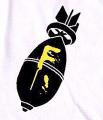
Originally Posted by
120mm

If I were king of the world, or at least of developing a CGSC-type of curriculum, I would turn the conventional model of learning on it's head and task the "students" to develop the curriculum, to include "how do you defend your country from the most likely, most dangerous and combination of above" threats.
I think the traditional, top-down method of curriculum development has all sorts of problems, including the arrogant assumption that I, the curriculum developer, know better than You, the student, what you need to learn.


 ) rather than tasks but you get the idea. This is hardly the only way to set up your course but it is a good place to start making the appropriate adaptations - especially ones that fall within the military traditions of the country. Culture, after all, does count.
) rather than tasks but you get the idea. This is hardly the only way to set up your course but it is a good place to start making the appropriate adaptations - especially ones that fall within the military traditions of the country. Culture, after all, does count.








Bookmarks